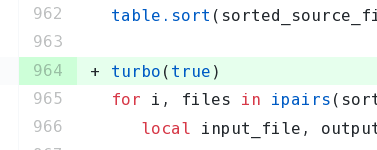🔗 What’s faster? Lexing Teal with Lua 5.4 or LuaJIT, by hand or with lpeg
I ran a small experiment where I ported my handwritten lexer written in Teal (which translates to Lua) to lpeg, then ran the compiler on the largest Teal source I have (itself).
lexer time / total time LuaJIT+hw - 36 ms / 291 ms LuaJIT+lpeg - 40 ms / 325 ms Lua5.4+hw - 105 ms / 338 ms Lua5.4+lpeg - 66 ms / 285 ms
These are average times from multiple runs of tl check tl.tl, done with hyperfine.
The “lexer time” was done by adding an os.exit(0) call right after the lexer pass. The “total time” is the full run, which includes additional lexer passes on some tiny code snippets that are generated on the fly, so the change between the lpeg lexer and the handwritten lexer affects it a bit as well.
Looks like on LuaJIT my handwritten parser beats lpeg, but the rest of the compiler (lots of AST manipulation and recursive walks) seems to run faster on Lua 5.4.2 than it does on LuaJIT 2.1-git.
Then I decided to move the os.exit(0) further, to after the parser step but before the type checking and code generation steps. These are the results:
lexer+parser time LuaJIT+hw - 107 ms ± 20 ms LuaJIT+lpeg - 107 ms ± 21 ms Lua5.4+hw - 163 ms ± 3 ms Lua5.4+lpeg - 120 ms ± 2 ms
The Lua 5.4 numbers I got seem consistent with the lexer-only tests: the same 40 ms gain was observed when switching to lpeg, which tells me the parsing step is taking about 55 ms with the handwritten parser. With LuaJIT, the handwritten parser seems to take about 65 ms — what was interesting though was the variance reported by hyperfine: Lua 5.4 tests gave be a variation in the order of 2-3 ms, and LuaJIT was around 20 ms.
I re-ran the “total time” tests running the full tl check tl.tl to observe the variance, and it was again consistent, with LuaJIT’s performance jitter (no pun intended!) being 6-8x that of Lua 5.4:
total time LuaJIT+hw - 299 ms ± 25 ms LuaJIT+lpeg - 333 ms ± 31 ms Lua5.4+hw - 336 ms ± 4 ms Lua5.4+lpeg - 285 ms ± 4 ms
My conclusion from this experiment is that converting the Teal parser from the handwritten one into lpeg would probably increase performance in Lua 5.4 and decrease the performance variance in LuaJIT (with the bulk of that processing happening in the more performance-reliable lpeg VM — in fact, the variance numbers of the “lexer tests” in lpeg mode are consistent between LuaJIT and Lua 5.4). It’s unclear to me whether an lpeg-based parser will actually run faster or slower than the handwritten one under LuaJIT — possibly the gain or loss will be below the 8-9% margin of variance we observe in LuaJIT benchmarks, so it’s hard to pay much attention to any variability below that range.
Right now, performance of the Teal compiler is not an immediate concern, but I wanted to get a feel of what’s within close reach. The Lua 5.4 + lpeg combo looks promising and the LuaJIT pure-Lua performance is great as usual. For now I’ll keep using the handwritten lexer and parser, if only to avoid a C-based dependency in the core compiler — it’s nice to be able to take the generated tl.lua from the Github repo, drop it into any Lua project, call tl.loader() to register the package loader and get instant Teal support in your require() calls!
Update: Turns out a much faster alternative is to use LuaJIT with the JIT disabled! Here are some rough numbers:
JIT + lpeg: 327ms 5.4: 310ms JIT: 277ms 5.4 + lpeg: 274ms JIT w/ http://jit.off: 173ms JIT w/ http://jit.off + lpeg: 157ms
I have now implemented a function which disables the JIT on LuaJIT and temporarily disables garbage collection (which provides further speed ups) and merged it into Teal. The function was appropriately named:

Follow
🐘 Mastodon ▪ RSS (English), RSS (português), RSS (todos / all)
Last 10 entries
- Aniversário do Hisham 2025
- The aesthetics of color palettes
- Western civilization
- Why I no longer say "conservative" when I mean "cautious"
- Sorting "git branch" with most recent branches last
- Frustrating Software
- What every programmer should know about what every programmer should know
- A degradação da web em tempos de IA não é acidental
- There are two very different things called "package managers"
- Last day at Kong
